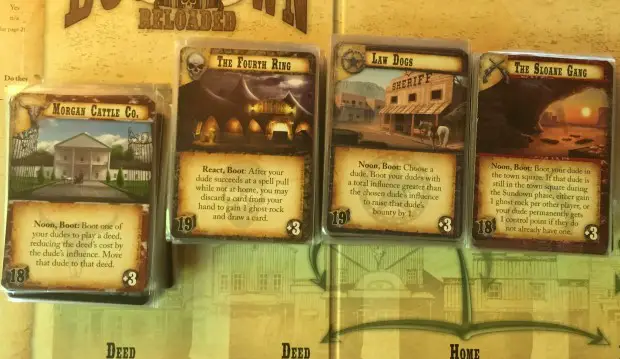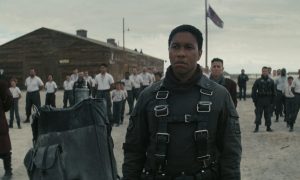In the town of Gomorra, California, the conflict between the Sheriff’s Law Dogs and the outlaw Sloane Gang has no end in sight. Shootouts have lead to mass casualties on both sides, but neither can take their eyes off the elusive Morgan Cattle Company, whose massive wealth funds some bizarre inventions, or the ungodly Fourth Ring, the evil circus of carnies and hex-slinging hucksters. In Doomtown Reloaded, players compete using their influence and their lead against other posses in this town. The theme of this bizarre universe comes through brilliantly in every aspect of Doomtown. From dudes moseying across town to the fact that every card doubly functions as a card to be used in poker hands, Doomtown is a very intelligent card game with a very intelligently incorporated theme. It mixes fast card games with area control games. Players win when they have more control over the town than their opponent has influence. Control points mostly come from deeds (or locations) that you control, while influence generally comes from dudes (or characters) that you recruit. Thematically, this means that you are trying to build and/or take control of the official buildings, businesses, and churches in Gomorra, while also eliminating enough of your rivals so that they cannot challenge your dominance.
As you are attempting to assert your control, many of the conflicts are resolved through a poker mechanic that is brilliantly incorporated into the game. At first the game will seem very random and chaotic, but as you play more you will find more ways of mitigating luck. There are countless ways to stack your hand, to cheat, or to punish your opponent for cheating, allowing you to turn a game of chance into a (hopefully) sure gamble. Each card in this game serves two purposes. First, each card can be used for its in-game effect: as a deed, a dude, an event, or a good/spell. Second, each card has a poker value represented by a rank and suit. So, as you build a deck, you will have decide how each card affects your game play and also your poker draws. You are allowed to stack your hand, but some cards will punish you having draws that would be illegal in a standard deck of 52 cards.
There are four main types of cards. The deeds are diamond cards, and they represent physical locations. They generally provide their owner some income each round, as well as some special effect and control points for their controller. Note that the person who played a deed can lose control of it. Next, dudes are your spades, the actual characters you can recruit through the game. They often have some special abilities, influence in the town, and shootout modifiers. Represented by bronze and silver bullets, these modifiers are what allow you to stack your draw hands during fights. Actions cards are the clubs cards, one-time use cards that give you some immediate bonus. Finally, items and spells are your heart cards. These are equipment and permanent modifiers for your dudes.
To start out the game, you choose your faction identity, as well as your starting posse. To form your starting posse, you pick dudes whose total cost is less than or equal to your starting currency, which is listed on your faction identity card. All of these dudes start at your home location, which is represented by your faction identity card. Any left over currency is your starting money, which is called ghost rock in this game. Then the two players draw their starting play hand of five cards. Redraws are only allowed if one of the starting dudes allows it.
Play consists of four phases: the Gamblin’ Phase, the Upkeep Phase, the High Noon Phase, and the Sundown Phase. In the Gamblin’ Phase, each player bets one ghost rock (if they can’t they must borrow one from the bank), and then each player draws five cards separate from their play hand, and whoever draws the lower ranked hand becomes first players and wins the gambled currency. Players discard these cards, and play continues to the Upkeep Phase. During this phase, each location that a player owns and still controls produces ghost rock, giving the player some income for the turn. Some dudes also have an upkeep cost, meaning you either pay their cost or they are discarded. The High Noon Phase is when the bulk of the action happens, and players go back and forth performing one action until both sides pass. Note that if you pass and your opponent then takes an action, you can act again. Play then proceeds to the Sundown phase. During this phase, you first check to see if either player has more control points (coming mostly from deeds) than the other player has influence points (coming mostly from dudes). If one player does, they win the game. If not, each player can discard up to one card, redraws up to five cards, and all the exhausted cards are readied for the next round.
The main actions during the High Noon Phase are Shoppin’, Tradin’, Actin’, Movin’, or Callin’ Out. Shoppin’ allows you to play cards from your hand, paying the cost listed on the card. Dudes are played in your home area, while items and spells get played on dudes in locations you control. Deeds generally get played adjacent to one of your existing locations. Events can be played from anywhere. The next action Tradin’ simply allows two dudes at the same location to trade items. While Actin’ activates a dude, location, item, or spell for any noon abilities. Generally, you are required to boot a card to use it’s noon ability. When a card is booted, it is turned 90 degrees and cannot be used again in that round.
The next action, Movin’, allows a player to move an unbooted dude between any two locations. Locations include each player’s home (the faction identity card), any deeds played, and the town square, which separates the play areas of the two players. No one controls the town square, and anyone can enter it, leaving all dudes in the town square vulnerable. Movin’ usually boots a dude, exhausting them for the round, but there are two exceptions. If a dude moves from their home to an adjacent location (an adjacent deed or the town square), they do not boot; if a dude moves from the town square to any in-town deed or the opposing player’s home (not their own home), they do not boot. The booting mechanic forces you to decide how quickly you need the dudes to move; booted dudes are easy targets and usually can’t use their abilities. If a player moves into a deed that they did not play themselves, they might be able to gain control of that deed. The controlling player can use the deed’s abilities and is considered to have the control points of the location when determining victors. Control over deeds is resolved using the influence of dudes at that deed.
Callin’ Out is how you start shootouts, the most fun mechanic in the game. Shootouts resolve using poker hands, but depending on participating dudes, you can greatly stack your hand. To start a shootout, one of your dudes “calls out” one of the opposing player’s dudes at the same location. If the dude that is called out is booted, the opposing player cannot refuse the call out, and a shootout starts. If that dude is not booted, the opposing player can send the dude home booted to avoid the shootout. If the opposing player stays, a shootout begins.
During a shootout, the attacking player forms their posse, and then the other player forms their posse. Any dude at the location of the shootout can join the shootout whether or not they are booted; any unbooted dude in an adjacent location can join the shootout, but must move in booted. In a shootout, each player normally draws five cards, but the bullet rating on each dude changes that. Silver bullets let players draw additional cards, while bronze bullets let you discard cards and redraw new ones. Each player will name a main shooter in each posse that contributes their full bullet rating, while each other dude gives a bonus of one card for their bullet type. After each player has drawn their cards and performed any redraws (which are all done at once), each player then discards down to five cards to form the best poker hand. Before and after forming their poker hands, players will have the chance to play shootout events and activate shootout abilities. Poker hands are compared, and if there is not a tie in rank, then the losing player takes a casualty for each point of rank difference between the players. If a dude is sent to the discard pile, that counts for one casualty; if a dude is removed from the game (“sent to boot hill”), that covers two casualties. If there was a tie in rank, then each player takes one casualty, but the person with the higher value cards is said to be the winner. After the shootout, if both sides still have dudes at the location, there is a chance to retreat. First the loser of the shootout has a chance to send their dudes home booted, and then the winner has the same opportunity. If both sides still have dudes at that location, the shootout continues for another round and will continue until one posse is either dead or retreated.
I play a lot of card games, and Doomtown Reloaded is, hands down, one of the best games I have ever played. To say it is unique is a gross understatement. The poker mechanic (and the cheating) works so well thematically and is very fun and clever. The deck building is also very unique. Having to balance cards for their abilities and their ranks is very difficult, yet very rewarding. Also, picking your starting posse is very interesting and was a very wise addition to this game. Next, I have never seen a card game that does not need to use a board that has as big an emphasis on positioning as Doomtown. The game is all about area control and picking your fights. You may start to make moves on a certain area, but your opponent can of course respond to you at every step, ruining your plan by declaring a shootout before you are ready. Doomtown technically plays up to 4 players, but this is primarily for a 2-player game.
I do have to say that this game is not easy. There are many little rules and keywords, and the strategy is not at all readily apparent. However, this game is a lot of fun to figure out. During your first few games, both you and your opponent will make plenty of mistakes and will do too many shootouts, and you both will take massive blows. This blowout is frustrating if you cannot be lighthearted about the first few games, making this a potential con for more serious gamers. I suggest that, as you learn this game, you try to just have fun the first few times (a revolutionary concept right?). As you play more, the rules and strategies will make more sense, and, if you let it, this game will become more drawn out and also much richer. You will find ways to combat the luck of the draw, making this a serious game. Or, you can just continue doing endless shootouts; that’s fun too. It is actually amazing how this game can work very well as a casual game or a strategic game. But, you should play the first few games casually.
It is hard for me to find many cons with this game. I do have to mention that Doomtown includes a learn to play walk-through. This was a really good idea, but it was unfortunately not good. Reading it out loud felt like a tutorial video that we were awkwardly trying to act out ourselves. As a video, it probably would have worked, but, as it was, it just dragged on and was monotonous. This game works better if you discover the fun of playing it yourself. However, this is the only thing that I would say is universally negative about the game.
Yet, Doomtown is not for everyone. Some players will get frustrated losing all of their dudes on the first turn (a pretty common rookie mistake) because they want to just jump into the strategy of the game. So if you do not want to give Doomtown a few play-throughs where you play more casually as you learn the game, you would not like Doomtown. Second, some players also may not like how you cannot count on getting a few key cards out. Getting money and drawing new cards is very tight in this game, and many of your cards will get discarded during the Gamblin’ Phase and shootouts, so you cannot base your strategy around a few key cards. However, I do not think this is a negative for Doomtown; I think Doomtown simply forces players to think of deck-building in a new way, considering their deck as a whole. Besides for that, I would recommend Doomtown to anyone looking for a unique, fast-paced card game that has a strong theme and that is a lot of fun as you are figuring it all out.
I just want to add a quick word on the components and expandability of this game. There are plenty of expandable card games on the market right now, but Doomtown probably gives you the best value with the base game alone. After the first few games, I stopped using the optional player aid boards, but the player aid boards and tokens are all good quality. The box is also really well designed for easy storage, with plenty of easy storage options for expansions. The art and flavor text are equally amazing and evocative. When deck building, you can include up to four copies of a card, and the base game comes with two copies of each card. So, if you want to max out your probabilities of drawing certain cards in the base set, you will have to buy two copies of the core set. This is better than most expandable card games that require three core sets for max copies of all cards. However, you really do not need to buy a second set. The base game comes with enough cards to build four solid decks and still have many cards left over for deck building. They also have many expansions, which you can use to customize your deck. Twice per quarter, they release a Saddlebag, which contains 4 copies of 21 new cards. After three saddlebags are released, they release slightly larger Pine Boxes which generally add at least one new game mechanic. This is a game that is great regardless of whether or not you plan on customizing. Because the sets are all fixed you will not waste money on hunting for rares. Doomtown is a game that let’s you make it what you want it to be, whether that be a casual or a serious customizable card game.
Doomtown: Reloaded
Designed By: Dave Williams (II) & Mark Wootton
Published By: Alderac Entertainment Group
Players: 2-4
Ages: 12 and up
Time: 30 Minutes
Mechanics: Poker, area control, hand management
Weight: Medium
MSRP: $39.99

If you like absolute control and understanding strategy of a game quickly, Doomtown: Reloaded may frustrate you. However, if you approach this game casually as you try to figure it out, you will have a blast. The game is incredibly fun, and, as you start to figure out the strategy this becomes an incredibly rich experience.
PROS
- Pure fun to figure out
- Innovative game play
- Ways to mitigate luck
- Can be casual or serious
- Theme and components
CONS
- Difficult to figure out
- Chaotic at first
- Poor walk through guide






 Buy Now
Buy Now
 Buy Now
Buy Now
 Buy Now
Buy Now
 Buy Now
Buy Now
 Buy Now
Buy Now
 Buy Now
Buy Now















